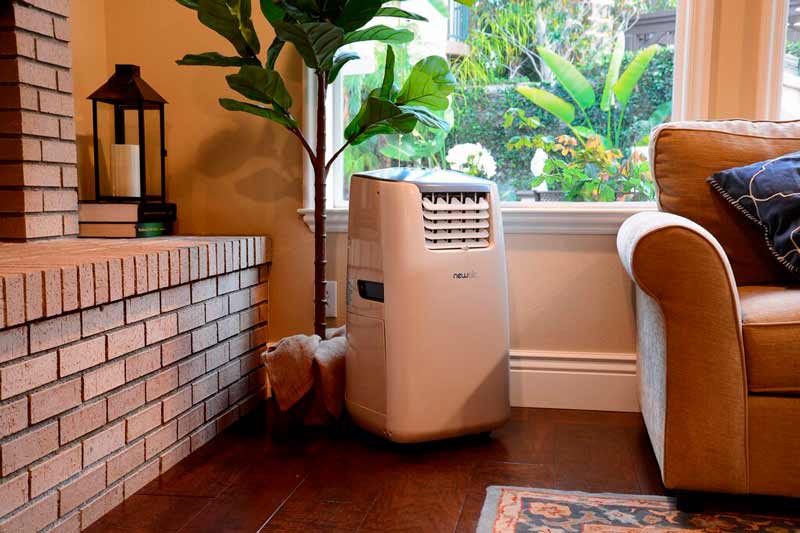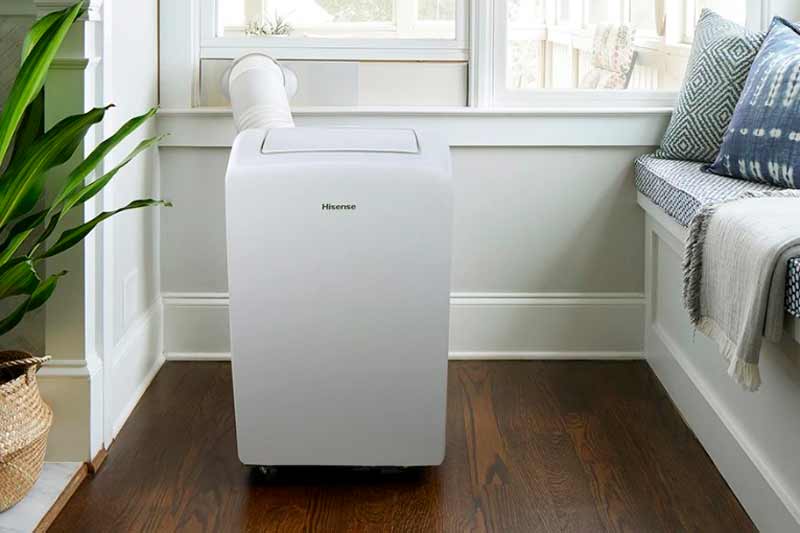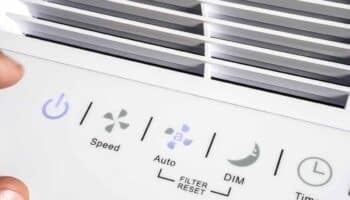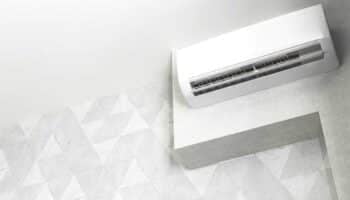Any type of HVAC system can sometimes emit unpleasant odors that can affect your indoor air quality and overall comfort. So knowing how to fix a smelly portable air conditioner—or any type of AC—is useful.
This guide will walk you through a variety of odors—what they mean, and how to fix them.
A portable air conditioner that smells bad could be due to a plastic part that is smoldering or burning, a dead animal, bacteria, or components that are burning out, such as the fan motor. These issues could cause a variety of odors, such as fish, mold, , rotten eggs, and more.
Keep reading and I’ll explain the source of the odor and what to do about it.
Why Your Portable Air Conditioner Smells and How to Fix It
Here are four common reasons for your air conditioner to smell and what to do to fix it.
#1 Musty Smells: Cause and Fix
Cool air that smells moist and earthy—you know, like a swamp—probably isn’t what you’re looking for. But often times, air conditioners do smell musty, moldy, and dank.
And there’s a very good reason for that. Typically, it’s because you haven’t been keeping up with a good cleaning schedule, and dirty air conditioners can stink—in a lot of different ways.
In my opinion, one of the most important best practices for air conditioner maintenance is keeping it clean.
Additionally, if moisture is allowed to accumulate in your air conditioner, that can cause a musty smell. The production of moisture or condensation is part of the cooling process, but if you live somewhere exceptionally humid, there’s a chance that extra moisture won’t drain away properly. This could lead to the growth of mold and that swampy musty smell.
Full or Partially Full Water Tank
The problem may also arise if you live in a dry environment and your air conditioner creates very little moisture. If there’s not enough water in a reservoir to trigger a notification to empty it, water may sit too long, creating a breeding ground for bacteria and mold.
Step 1
Check your air conditioner’s water reservoir — some units have more than one — and empty it as necessary.
Step 2
If you determine that the musty smell is coming from the water, you should also thoroughly clean the reservoir. A 50-50 mixture of water and vinegar should be sufficient to kill any bacteria.
Clogged Drain
A clogged drain could also be the culprit. Eventually, dust and dirt, and perhaps even algae can settle in the drain line or reservoir and create a clog. Once that happens, water will no longer drain, and again, you have the perfect environment for the growth of mold and mildew.
Step 1
Your air conditioner will likely have a visible drain spout and plug somewhere on the back. If you’ve confirmed that there is water in the reservoir, test that it can drain freely.
Step 2
Make sure you have a container — likely a shallow one — under the spout and release the plug. If it doesn’t begin to drain, you’ll need to find the clog. A small bottle brush can be used inside the spout.
Step 3
Fully clean the inside of the reservoir, paying attention to any dirt or build-up. Use a 50-50 vinegar and water solution to kill any lingering bacteria. Once the reservoir and the spout are clean and flushed, you should be good to go.
Dirty Filters
Something else that can lead to musty smells is a dirty filter. If you’re not changing them regularly and depending on what kind of dirt and debris has built up on it, you could be encouraging mold growth.
Step 1
Most portable air conditioners have permanent filters which need to be cleaned, however, some do have replacement filters as well. Depending on the needs of your filter — you’ll need to check your owner’s manual — clean or replace it.
Step 2
To clean your filters, simply mix together a solution of warm water and mild detergent — dish soap or hand soap will work — in a spray bottle. You can also simply submerge them in a sink of soapy water.
Step 3
Before reinstalling them, make sure they are completely dry. Don’t just wipe them dry, allow them to air dry or use a blow dryer. Reinserting them when they’re even slightly damp will encourage mold growth and the accompanying musty smell that you’re trying to get rid of.
If you want to get any replacement part – or see how much one would cost – click to enter your model number in the search bar below. Our partners at AppliancePartsPros stock almost every part with free guides on how to install them.

#2 Fixing A Portable AC Smelling of Rotten Eggs: Cause and Fix

Have you ever smelled rotten eggs? It’s a terrible smell, so you really don’t want your air conditioner fanning it around your room.
Let’s start with a little science. When things begin to decompose — whether animal or plant matter — they release hydrogen sulfide which is a colorless gas. The same thing can happen in standing water. It’s completely natural, but it smells like rotten eggs.
So from that, you should be able to guess that there’s a good chance you have something dead or decaying — or both — somewhere in your air conditioner. Or you have some standing water to deal with. Let’s start with that first.
Just because you’re not getting a notification that your water reservoir is full, that doesn’t mean there’s no water in it. This is especially true if you live in a dry climate, when your AC will generate less condensation.
Check Your Water Tank
You may just have an inch or two of water in the reservoir, but any amount of standing water is enough to cause a problem since it can still breed bacteria.
Step 1
Make it a point to regularly check your condensation reservoir, perhaps every week — or more if necessary.
Empty if necessary.
Step 2
Keep the water reservoir clean using soap and water. You can also soak the inside with a vinegar and water rinse. Vinegar is a known antibacterial, so this will kill the bacteria that cause the rotten egg smell.
Something is Dead & Decomposing
There’s also a small chance that there’s something dead inside your air conditioner. Obviously, to get inside it will need to be something very small, perhaps a mouse or an insect. Regardless, once something begins to decompose it can release a rotten egg smell.
Step 1
To the extent possible, take your portable air conditioner apart and inspect for anything dead.
Step 2
If you have the stomach for it, remove whatever you may find. If not, ask for help. Make sure you wear rubber gloves and completely clean up the area after removal.
#3 Air Conditioner Smelling Of Chemical Odors: Cause and Fix
If your portable air conditioner is new, and you’re smelling a chemical odor — that may sometimes smell like plastic — it could be caused by off-gassing.
Off-gassing commonly happens with HVAC equipment, carpets, furniture, and a variety of other household products. During the manufacturing process gases that get trapped begin to release when a product is unpackaged.
Typically, the odor will dissipate within a few days.
Provide sufficient ventilation
If the off-gassing is strong, open your windows to circulate the air. However, if the spell does not dissipate or seems to be particularly strong, contact the manufacturer, and ask for guidance.
#4 Burning or Burning Plastic Smells: Cause and Fix
Sometimes, your portable air conditioner may smell like something’s burning, it may even have the specific smell of burning plastic. Typically, you don’t need to be too concerned but you do want to source the cause of the smell and deal with it as soon as possible.

If you have a buildup of dust that has accumulated on the exterior and interior parts of your air conditioner, such as the fan motor coils, this can be the cause of a burning smell.
While your AC is operating it’s generating heat, and that layer of dust and dirt is getting hotter and hotter as time passes. Eventually, it can start to smell like it’s burning.
Do You Need a Dedicated Curcuit?
If your AC smells like burning plastic, do the following.
Check your breaker box or fuse panel to make sure that the amperage on the circuit you’re using your air conditioner on is sufficient. If your AC is too powerful for that circuit and outlet, you’ll need to move it to another spot.
Plugging any appliance into an outlet that doesn’t provide enough power can cause a short circuit, which may lead to burning wires and ultimately burning plastic.
Faulty Wiring
Another culprit could be faulty wiring — perhaps because of the above problem — or a faulty component. It could also be due to loose connections, a faulty part, or damaged insulation.
Do a visual inspection for any frayed wires or loose connections. If it’s the power cord, these can typically be replaced but you’ll need to refer to your user’s manual for the correct part. Otherwise, consult a licensed technician.
If you want to get any replacement part – or see how much one would cost – click to enter your model number in the search bar below. Our partners at AppliancePartsPros stock almost every part with free guides on how to install them.

Lack of Cleaning and Maintenance
Finally, the burning smell in your portable AC could be due to a lack of maintenance. All air-conditioners require regular maintenance and cleaning , and if you neglect either it could lead to parts malfunctioning or overheating.
The user manual that came with your conditioner will indicate the proper maintenance schedule. This will include, but is not necessarily limited to, keeping your filters cleaned or replaced and keeping the entire unit cleaned and dusted regularly.
Note that failure to maintain your air conditioner could eventually lead to it no longer cooling at all.
Conclusion
Understandably, no one wants to have to deal with a smelly air conditioner, especially if it’s a very offensive odor.
Fortunately, in most cases, the smell can be fixed with a simple cleaning, so keeping up with regular maintenance is imperative.
To recap, here are the smells we discussed:
- Musty smell
- The smell of rotten eggs
- Chemical odors
- A burning smell, that may be plastic or something else
If the burning smell is sourced back to an electrical issue, that must be dealt with immediately, and if the chemical odor lingers for too long, contact the manufacturer.
Hopefully, this article has addressed your specific issue.
While you’re here, why not check out the related posts below? Perhaps we can help you with something else.







